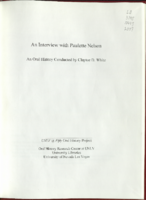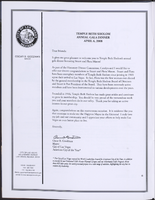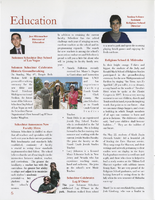Search the Special Collections and Archives Portal
Search Results
Flora and Stuart Mason oral history interview
Identifier
Abstract
Oral history interview with Flora and Stuart Mason conducted by David G. Schwartz on February 27, 2010 for the Remembering Jay Sarno Oral History Project. Flora Mason begins by discussing the relationship between her family and the Sarnos. Mason describes that she and her husband socialized with Jay and Joyce Sarno in the 1960s because they lived on the same street in Las Vegas, Nevada. Stuart Mason recounts how the Sarnos were incredibly friendly and Jay occasionally invited him to play golf. Mason then chronicles his role as a contractor and the work he did for Jay Sarno throughout his career. He talks about how many of the development ventures of Sarno's were funded by Jimmy Hoffa and the Teamster’s Union. Lastly, Mason discusses how Sarno understood the gaming industry more than any other casino operator and how that was attributed to the success of Caesars Palace.
Archival Collection
Jay C. Sarno Jr. oral history interview
Identifier
Abstract
Oral history interview with Jay C. Sarno Jr. conducted by David G. Schwartz on July 10, 2008 for the Remembering Jay Sarno Oral History Project. Sarno begins by discussing how his parents met in the early 1950s in Miami, Florida and were married within six weeks. Sarno then describes his family moving to Las Vegas, Nevada in 1965 and living in the Dunes Hotel for the first three weeks. Sarno then chronicles his parents’ marriage and their divorce in the 1970s. Sarno then recounts his father’s relationship with Jimmy Hoffa and Allen Dorfman and the visits Hoffa made to Las Vegas to see his father. Sarno talks about the way his father treated him and his brother differently than his sisters. Lastly, Sarno discusses how he and his siblings were surprised their father owed the Internal Revenue Service over one million dollars at the time of his death.
Archival Collection
Helen E. La Plant oral history interview
Identifier
Abstract
Oral history interview with Helen E. La Plant conducted by Claytee D. White on October 08, 2003 for the Boyer Early Las Vegas Oral History Project. La Plant begins by discussing her early life in Minneapolis, Minnesota during the 1920s and 1930s and joining the United States Army at the age of twenty-one. La Plant then describes serving in Okinawa, Japan after World War II as a photographer for the Signal Corps. La Plant describes her return from Japan and decision to attend photography school in New York City, New York. La Plant then chronicles her experiences moving to Las Vegas, Nevada in the late 1950s to work at the Nevada Test Site as a photographer. She then recounts the shift from aboveground atomic testing to underground testing and her role as head of the photography department at the Nevada Test Site. Lastly, La Plant talks about entertainment during the 1960s in Las Vegas.
Archival Collection
Charles A. Hendel Notebook
Identifier
Abstract
The Charles A. Hendel Notebook is comprised of one notebook of poetry and prose written by Charlie Hendel between 1960 and 1976. Topics include the state of Nevada, World War II, American nationalism, and biographical materials about Charles Hendel.
Archival Collection

Transcript of interview with Dr. Catherine Bellver by Caryll Batt Dziedziak, November 13, 1995
Date
Archival Collection
Description
Dr. Catherine Bellver is a woman with tenacity. How else could one describe her drive to create the Women's Studies Program spanning fifteen years? As a faculty member in the Department of Foreign Languages, Dr. Bellver first joined the Women's Studies steering committee in 1979. In the following decade, the committee oversaw the formation of the Women's Studies Program, including: procuring administrative and faculty support, creating bylaws and course criteria, critiquing proposed cross-listed courses, and selecting course offerings. During that period she also worked with a volunteer group to create and staff the first Women's Center on campus. In the early Nineties, she played an instrumental role in the presentation of four public colloquia that addressed key issues pertaining to women. Dr. Bellver acted as interim director of the Women's Studies Program while overseeing the search for a permanent director. She continued to remain involved with the Women's Studies program, serving as faculty member on several committees. She has also worked in the Women's Caucus on the regional and national levels of the Modem Languages Association Dr. Bellver is currently Distinguished Professor of Spanish in the Department of Foreign Languages at the University of Nevada, Las Vegas. Her work has appeared in journals such as Anales de la Literature Espanola Contemporanea, Hispanic Review, Hispanofila, Insula, Journal of Interdisciplinary Studies, Monographic Review/Revista Monografica, Revista de Estudios Modernos, Revista Hispanica Moderna, Romance Notes and Romanic Review. Dr. Bellver's participation in the creation of the Women's Studies Program illustrates how critical institutional and social progress can result from the commitment of a determined group of individuals. Her decades of involvement in creating an academic arena for the study of women and gender issues underscores the significance of women's contributions to the history of Las Vegas. In addition to the history of the Women's Studies Program at the University of Nevada Las Vegas this interview contains information regarding the creation of the first Women's Center on campus.
Text

Transcript of interview with Della Mae Rostine by Irene Rostine, October 31, 1991
Date
Archival Collection
Description
Della Mae Rostine left Missouri with her husband, Rocco, in 1942, and headed to Las Vegas. Happy to leave behind the hard life and instability the mining industry had to offer, after living in Las Vegas for the first year the couple settled in Henderson, Nevada, known as the townsite at that time. Della Mae’s oral history provides readers with a glimpse of what life was like for the 14,000-plus individuals and families who also moved to southern Nevada during the same period in order to make a living in the growing “war work” industry the area had to offer. Della Mae shares the hardships faced in finding housing, especially for families with children. She discusses challenges ranging from securing home furnishings to purchasing groceries, including the rations on gasoline and butter at that time. Della Mae also discusses her experiences with the Basic Magnesium plant where her husband was hired as a construction worker in the early days of the plant and where she would work briefly as a machinist making shell casings and monitoring the down time on the production line. She also touches briefly on the social opportunities the BMI plant, and later Rheem Manufacturing, offered to the workers and their families. When World War II ended, more than half of residents of the townsite left, leaving fewer than 7,000 people to form what would later become the city of Henderson, Nevada. Della Mae’s oral history is a brief overview of a family life which began when BMI was just getting off the ground and continued through the many changes that took place in the BMI complex and the town site over several decades. The timing of the Rostine family’s arrival and the fact that they stayed and made a permanent home in Henderson led to their designation as one of Henderson’s “founding families.”
Text

Transcript of interview with Paulette Nelson by Claytee D. White, March 2, 2009
Date
Archival Collection
Description
Text
Minutes Temple Beth Sholom Board of Directors meetings, September 1952 - December 1956
Date
Archival Collection
Description
The meeting minutes of the board of directors of Temple Beth Sholom, then known as the Jewish Community Center of Las Vegas, Inc., include the proceedings of meetings held from 1952 to 1956. Also included are periodic reports from committees of the board such as Jewish education, cemetery, and building committees, and budget reports.
Text


